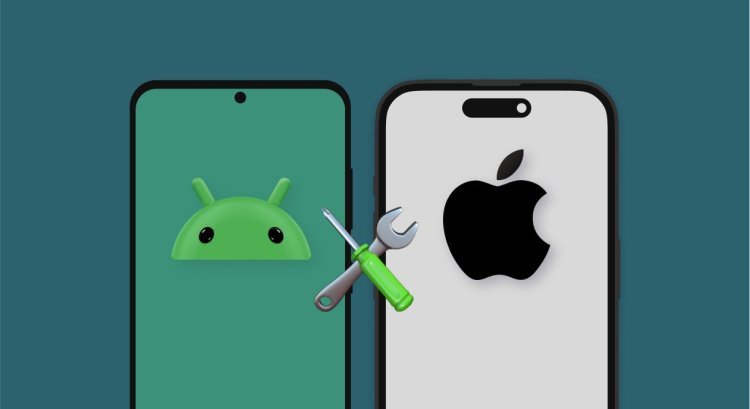iOS vs. Android Development: Key Differences in Skills & Expertise
Explore the key skill differences between iOS and Android development. Learn what expertise is needed for each platform and how to choose the right developers.

Mobile app development is a critical decision for businesses, especially when choosing between iOS and Android platforms. While both require skilled developers, their technical expertise, tools, and development processes differ significantly. This article explores the key differences in skills and expertise required for hire iOS app developers and hire Android app developers, helping you make informed hiring decisions.
1. Programming Languages and Frameworks
One of the most significant differences between iOS and Android development lies in the programming languages used.
-
iOS Development: Developers primarily use Swift and Objective-C. Swift is Apple's modern programming language, offering faster performance and cleaner syntax.
-
Android Development: Android developers use Java and Kotlin, with Kotlin becoming the preferred choice due to its concise syntax and improved safety features.
When you hire iOS app developers, ensure they have expertise in Swift, while for Android, look for Kotlin proficiency.
2. Development Tools & Integrated Development Environments (IDEs)
Both platforms provide official development tools tailored to their ecosystems.
-
iOS: Developers use Xcode, Apple’s official IDE, which provides a seamless environment for coding, testing, and debugging.
-
Android: Android Studio, backed by Google, is the primary IDE for Android development, featuring flexible build systems and a robust emulator.
If you plan to hire Android app developers, ensure they have hands-on experience with Android Studio.
3. UI/UX Design Differences
The design principles for iOS and Android differ significantly due to their respective design guidelines.
-
iOS: Apple follows the Human Interface Guidelines (HIG), which emphasize minimalism, depth, and smooth animations.
-
Android: Google’s Material Design provides more flexibility with shadows, motion, and adaptive layouts.
An experienced iOS app developer will prioritize simplicity and uniformity, while an Android app developer will focus on customizing the UI for different devices.
4. App Distribution & Monetization
The app distribution process and revenue models also vary across platforms.
-
iOS: Apps are published on the Apple App Store after a strict review process. Monetization primarily comes from in-app purchases and paid apps.
-
Android: Google Play Store has a more lenient approval process. Developers often use a combination of in-app ads, purchases, and subscriptions for revenue.
When you hire iOS app developers, ensure they understand Apple’s submission guidelines to avoid rejection.
5. Platform Fragmentation
Device fragmentation is a major challenge in Android development.
-
iOS: Apple controls both hardware and software, resulting in fewer device variations and better optimization.
-
Android: With numerous manufacturers and screen sizes, Android developers must ensure app compatibility across various devices.
To hire Android app developers, look for candidates skilled in responsive UI design and device testing.
6. Security & Data Privacy
Security is a crucial factor in mobile app development, with iOS offering more stringent measures.
-
iOS: Apple’s closed ecosystem, strict app store policies, and frequent updates enhance security.
-
Android: Being open-source, Android is more vulnerable to security threats, requiring developers to implement additional security measures.
If your project demands high security, prioritize iOS app developers with experience in data encryption and compliance standards.
7. Development Cost & Time
The time and cost of developing an app vary based on platform complexity.
-
iOS: Faster development due to fewer devices and a standardized ecosystem.
-
Android: Longer development cycles due to device fragmentation and the need for extensive testing.
To manage cost-effectiveness, businesses should hire Android app developers with expertise in optimizing development workflows.
8. Maintenance & Updates
Updating an app post-launch requires different strategies for iOS and Android.
-
iOS: Updates are quickly adopted by users due to Apple’s mandatory update policies.
-
Android: Older devices may not receive updates, requiring developers to maintain backward compatibility.
Ensure that the iOS or Android developers you hire have experience in long-term app maintenance.
Conclusion
Choosing between iOS and Android development depends on business goals, target audience, and technical requirements. If your priority is a controlled ecosystem with strong security, hire iOS app developers. If you aim for a wider audience with more customization options, hire Android app developers.
By understanding these key differences, you can make informed hiring decisions and build a successful mobile application tailored to your business needs.
FAQs
1. Which platform is easier to develop for, iOS or Android?
Developing for iOS is generally easier due to a standardized ecosystem and fewer device variations, whereas Android development requires handling multiple screen sizes and hardware configurations.
2. How do I choose between hire iOS app developers and hire Android app developers?
Consider factors like your target audience, budget, security needs, and desired app features. If you prioritize security and a premium user base, go for iOS. If you want broader reach and customization, choose Android.
3. Which platform is more profitable?
Historically, iOS apps generate higher revenue per user, particularly through in-app purchases, while Android apps reach a larger user base and often monetize through ads.
4. Do iOS and Android developers need different skill sets?
Yes, iOS developers must be proficient in Swift and Xcode, while Android developers need Kotlin/Java and experience with Android Studio.
5. How long does it take to develop an iOS or Android app?
The timeline varies based on app complexity, but iOS apps often take less time due to a unified ecosystem, while Android apps require extensive testing across multiple devices.
6. Can I develop one app for both platforms?
Yes, cross-platform development frameworks like Flutter and React Native allow for a single codebase to run on both iOS and Android, reducing development time and costs.
What's Your Reaction?















